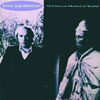VAN MORRISON : NO GURU, NO METHOD, NO TEACHER
- Got to Go Back
- Oh the Warm Feeling
- Foreign Window
- A Town Called Paradise
- In the Garden
- Tir Na Nog
- Here Comes the Knight
- Thanks for the Information
- One Irish Rover
- Ivory Tower
Label : Mercury
Release Year : 1986
Length : 50:50
Review (AllMusic) : No Guru, No Method, No Teacher was Van Morrison's second studio album for Mercury, following A Sense of Wonder and Live at the Grand Opera House Belfast. It was recorded at the height of his spiritual period and is among the most laid-back records of his career. Morrison's notion of seeking, and being all but drowned by his obsession with "reclaiming the previous," is everywhere here, beginning with the set's opener, "Got to Go Back." With a striking wide-open acoustic piano, accompanied by a solo on oboe (by Kate St. John no less) twinned by Richie Buckley's soprano saxophone and an acoustic guitar, Morrison offers in waltz tempo these reflections: "When I was a young boy back in Orangefield/I used to look out my classroom window and dream/And then go home and listen to Ray sing/'I Believe to My Soul' after school/Oh that love that was within me/You know it carried me through/Well it lifted me up and it filled me/Got to go back/Got to go back/To the feeling." And if anything, this album is, like so many other statements made by Morrison in the years before this, a consumptive obsession with innocence, with the puzzling notion of God, of liberation from earthly constraints, while being immersed in them by the sheer physicality in his music - despite every attempt at ethereality. This is followed by "Oh the Warm Feeling," which only underscores the notion of memory and lost innocence amid lovely oboe, acoustic guitar, organs, and vibes as Morrison sings in the past tense, juxtaposing it against the present. The Celtic soul that comes elegiacally forth from "Foreign Window" is among the album's finest tracks. This is one of the most nakedly spiritual cuts Morrison has ever recorded, looking at a person or Muse, coming once more out of his past that is at once part of his eternal present, where he weaves some of his finest lyrics with one of his more dynamic and texturally varied compositions; it's a love song, and an entreaty with a gorgeous arrangement. If anything, these three cracks usher in the notion that this album is an extended meditation that reflects a willingness to stay present in the tension and mantra-like melody of his concerns and not escape them - very often. "A Town Called Paradise," however, is the exception. It is a classic midtempo rocker that seems to come from as far back as Astral Weeks, with its woven, pulsing layers of acoustic guitars, though punctuated by female backing vocals, tenor saxophone, and an electric solo guitar. Interestingly, there is a play on words here, called "Here Comes the Knight," which doesn't reference the earlier version he recorded with Them, and is elliptical in terms of its lyrics. There are a couple of longer selections here as well, in the Celtic R&B of "Tir Na Nog" and the frustration in "Thanks for the Information," detailing the pitfalls of the spiritual path. Combined, these tunes make for an album that will be deeply satisfying and even provocative for seasoned Morrison fans, but make it a slog for newer or less dedicated listeners.
